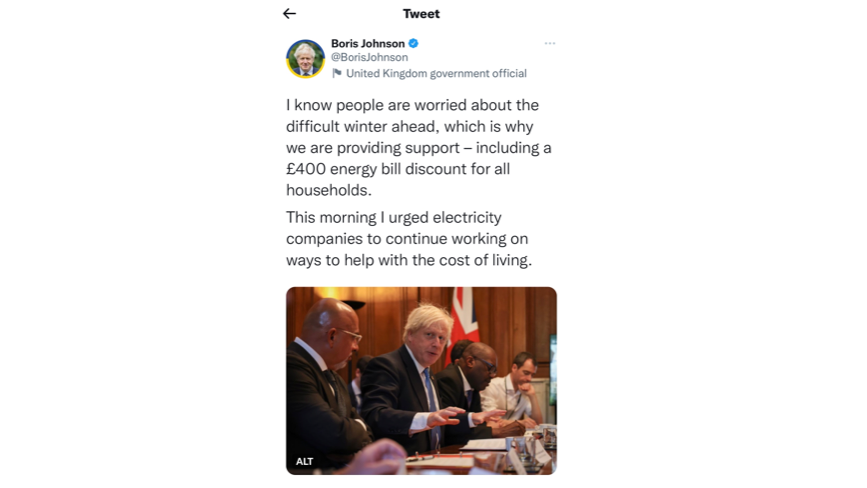Holly's Blog - Two Words. Fuel bills. Feckin Nora.
5 Aug, 2022

Two words on my lips this week. Fuel bills. At the start of the year the average bill was about £1,400. From October the average bill is forecast to rise to £3,580 with another rise in January to about £4,200.
This means that for every £100 you pay today, you’ll pay about £215 in January. Feckin Nora.
What can we do?
For years I’ve written articles about shopping around and switching. Trouble is, the fixed price tariffs on offer today don’t look that compelling.
As a very general rule of thumb, the emerging consensus is that if you are on a default tariff today, and the fixed rate deal on offer is LESS than 75% more expensive, it might be worth considering. Gulp. Remember to look out for any exit fees and factor this in – because the future is so uncertain, being locked into something feels like a double-edged sword.
Here’s an example of what’s on offer. I’m with E.ON. I currently pay 28.4p per kilowatt hour and have a standing charge (basically a fine for being alive) of 51.63p each day. To move to a fix with them, yesterday I was quoted 56p per kilowatt hour. That is literally twice what I am paying today – an 100% increase. You can stick that up your jumper – for that increase, I’ll take my chances today.
There are other well documented things to do. Turning the thermostat down by 1 degree should save about £100 a year. Turning appliances off. Learning to love washing up and not the dishwasher. Using a microwave not an oven. Repurposing the tumble drier into a cupboard. Channelling our inner Swampy and limiting hot water /showers.
What are the Government doing?
Although my default mode is humour, I don’t mean to sound flippant or complacent really. The scale of this problem is frightening with an estimated 8 million households set to tip over into fuel poverty. It needs government intervention. And fast. We cannot wait for the Conservative Party to finish its popularity contest with 160,000 party members, issuing sound bites and vague promises, and show up again in September.
Everyone is getting £400 off their bills. If you pay by a fixed direct debit, £66 will automatically come off each amount in October and November, and £67 will come off from December to March. If you pay on receipt of a bill, these amounts will show up as credits in the first week of each month.
In addition, households that receive the Winter Fuel Payment – people born on or before 25 September 1956 – will get an additional £300 in November and December.
In total, working-age households on Universal Credit and other means-tested benefits will get about £1,200 of additional help – including reductions to energy bills and council tax, as well as £650 direct to their bank account.
Anyone feeling concerned will take much comfort from Boris Johnson’s tweet yesterday, which kindly confirms the provision of a water pistol for those facing wildfires.

Nothing good ever came of Boris’s urges. A quick fumble does not solve a crisis.
Windfall taxes
Here’s a big number. In the last 3 months, BP and Shell made profits of around £15 BILLION. Not because of any hard work, or great innovation, but because of god-awful global events. For more of these abnormal profits not to be used to help solve this problem is weak.
Well Holly, you say, you’re all about investments and being a shareholder. Long live capitalism! Hhmmmm. One argument that annoys me is that “lots of cuddly pensioners own shares like BP and Shell in their pensions so you don’t want to hurt them”. Absolute cojones.
Imagine an average pension account, for someone in their 40s and invested almost fully in shares. It will have 1,000s of underlying investments from all over the world.
Let’s say that 20% of the pension is in UK shares and half of that is in the Big Boys in the FTSE 100. Shell is 8.3% of the FTSE 100 today and BP is 3.9%. So for every £100,000 in a bog standard pension fund, maybe £10,000 is in the FTSE 100 – so £830 of your pension will be in Shell and £390 in BP. So £1,220 in Big Fuel Guys.
If the result of a further windfall tax is enough to send the share price down by say 10% if investors get the heebie-jeebies, then the impact on a pension fund could be for it to fall by about £122 for every £100,000 invested. And the aforementioned cuddly pensioners will typically not have it all in shares anyway so the impact would be even less.
Clearly these numbers are rough and ready (please don’t write to me about dividends/compounding/asset allocation my beloved economist readers xx) but you get the point. It’s not material.
And as for the idea that these Big Energy guys will suddenly have a strop and not invest in the UK anymore, I don’t believe that either. And finally the idea that this will divert money which would otherwise be allocated to green investment – really?? Behind the pledges, the proportion of investment here is woefully small still so if there were to be counter offers about future green investment, I’m all ears. Could be a very good time to slap something on the negotiation table, and add to the Boris’ Urges.
I predict a riot…
“Can’t pay won’t pay.” I remember having a great day out as a student, with my obligatory DMs and Silk Cuts at an anti Poll Tax demo. Those were the days. Campaigns are springing up to incite mass civil disobedience of a similar scale. Trouble is, we all have entered into a contract with our energy supplier – it’s different to picking a fight with local government and energy firms can make your life a lot more unpleasant. As well as stuffing up your credit rating, they can appoint a debt collector and grant a warrant for your supplier to enter your home and fit a pre-payment card meter. If you can afford to pay – I don’t think it’s worth picking this fight.
If you can’t, there is help available. Talk to your energy firm – remember they may well take a pragmatic view and see that a bit of money from you and a plan is better than nothing. If you are struggling with debt – and lots of people are so don’t let any sense of shame stop you from seeking help – Citizens Advice and StepChange are sources of help. And British Gas do have a charitable arm to help, but they will ask that you have sought debt advice before considering your application.
So what’s next?
Mr Mackay Senior is a prophet of doom. He thinks that the level of credit that our energy firms will notionally extend us in the winter months will be so high, that they will start to get more aggressive. Let’s say someone racks up huge usage in January 2023 – the shortfall for an energy firm taking a fixed direct debit will be materially higher than it was in January 2022. So that jumps up 18 places in the priority list of things to discuss at the Board meeting.
If you follow this through to its logical conclusion, an unforeseen consequence of this inevitable cost of living conflict will be a total meltdown of the magistrates and Court system. Think of the backlogs today. And then chucks this into the mix.
I’m sorry folks, but it’s hard to feel positive about 2023. From an investment point of view, large stable ‘boring’ companies like banks, Shell and BP should do ok. Any firms which rely on consumers’ discretionary spend will be hammered – this makes sectors like UK small caps (smaller companies) look a bit dicey. And Butane gas camping stoves will be to 2023 what yeast and loo roll were to 2020. Get yours today.
On that wildly upbeat note, I am going to slope off and hit the kids’ paddling pool. Before I melt. Have a great weekend all.
Holly

Stay up to date!
Already have an account? Login
Post a comment:
This is an open discussion and does not represent the views of Boring Money. We want our communities to be welcoming and helpful. Spam, personal attacks and offensive language will not be tolerated. Posts may be deleted and repeat offenders blocked at our discretion.









